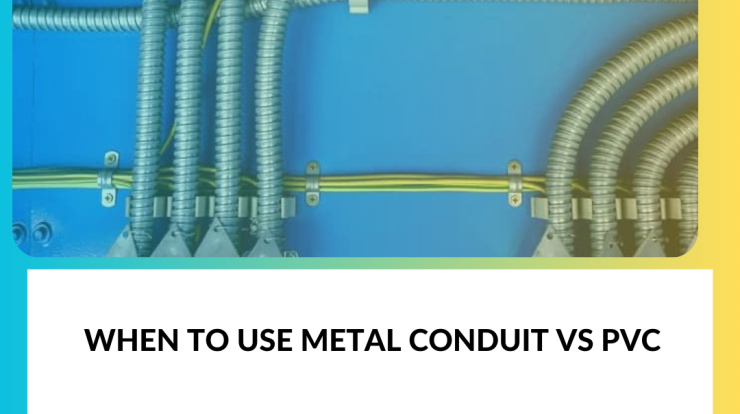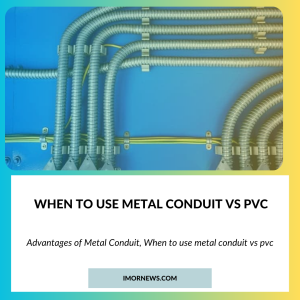
Working in electrical engineering, people always debate whether metal or PVC conduit is preferable. Since it influences both safety and efficiency, this is a topic of great interest. Like how a conductor moves throughout a symphony of lines, the conductor should be skilled in handling the conduit.
Metal conduit and PVC conduit comprise the major components of the electric symphony. A conductor will help to guard the delicate current.
Metal conduit shields from the elements and provides a base for the energy transfer. Conversely, PVC tubing is affordable and adaptable, akin to a chameleon able to disguise and fit any contemporary environment.
Before a decision is taken, nevertheless, one must carefully consider essential pragmatic, environmental, and aesthetic elements. To discover the best harmony for any job, the conductor—the electrician—must pay attention to the various melodies carried by every kind of conduit.
Electrical Conduit: Metal vs. PVC
Electrical conduit is protective tubing used for routing and enclosure of electrical wiring. It guarantees the safe running of the wires by mechanical protection, therefore avoiding damage. Conduit makes installation, maintenance, and repairs simpler as well as helping to arrange and control electrical wiring.Two main varieties of conduit exist: PVC and metal conduits.
Every type has benefits and drawbacks, hence the decision depends on particular project needs.

Types of Electrical Conduit
Made of steel, metal conduit—also known as EMT—Electrical Metallic Tubing—is a sturdy, robust conduit. For electrical wiring, it provides exceptional strength and protection, which qualifies for uses where the wire may be subjected to demanding surroundings or possible physical damage.Made of polyvinyl chloride, PVC conduit—also called rigid non-metallic conduit—RNMC—is a lightweight and flexible conduit.
Perfect for usage in damp or corrosive surroundings, PVC conduit is chemical and corrosion resistant. Furthermore less costly than metal conduit is it.
Factors to Consider When Choosing Conduit
Several considerations determine whether metal or PVC conduit is best, including:
Environmental Conditions: Applications where the wiring is exposed to hostile surroundings or possible physical damage would find metal conduit appropriate since it is more sturdy and impact-resistant. Perfect for usage in damp or corrosive surroundings, PVC conduit is more resistant to chemicals and corrosion.
- Cost: Typically speaking, PVC conduit is less costly than metal conduit.
- Installation: Since PVC conduit is lighter and more flexible than metal conduit, installation of it is simpler.
- Fire Resistance: Whereas PVC conduit is not fire-resistant, metal conduit is by nature
- Electrical Code Requirements: Local building codes may stipulate the kind of conduit to be used for particular purposes.
Metal Conduit Applications
Common use of metal conduit is in:
- Industrial and commercial buildings: Industrial and commercial buildings: Wherever wire is subjected to possible physical damage or hostile surroundings.
- Outdoor applications: Where the conduit faces the elements.
- High-voltage applications: Where the conduit must offer additional protection.
PVC Conduit Applications
Common applications of PVC conduit are:
- Residential buildings: Where there is less exposure to demanding surroundings for the wiring?
- Damp or corrosive environments: In which case the conduit must resist corrosion.
- Applications where cost is a factor: often less expensive than metal conduit is PVC conduit.
Metal Conduit
Made of metal—such as steel, aluminum, or stainless steel—metal conduit is a class of electrical conduit For its strength, fire resistance, and endurance, it is often utilized in electrical installations. Many uses call for metal conduit since it provides various benefits over other kinds of conduit, such PVC.
Advantages of Metal Conduit, When to use metal conduit vs pvc
Many uses call for metal conduit since it provides various benefits over other kinds of conduit.
- Durability: Metal conduit is quite strong and resistant to hostile conditions including high temperatures, moisture, and corrosive agents. This qualifies for usage in outdoor, commercial, and industrial settings.
- Strength: Strong and sturdy metal conduit gives great protection for cables and electrical wires. It can resist mechanical damage including forces of collision and crushing.
- Fire Resistance: Metal conduit is fire-resistant, hence it can help stop the spread of fire should an electrical fire strike. It is also resistant to high temperatures, which qualifies for usage in places with fire risk.
- Grounding: Metal conduit can be used as a grounding conductor, therefore allowing a path for electrical current to pass to the ground in should of a malfunction. This shields machinery and helps to stop electrical shocks.
- Reusability:Metal conduit is reusable, hence it may be taken out and used again in another construction. This can save money and assist to lower trash.
Variations of Metal Conduit
There are several varieties of metal conduit, each with special uses and characteristics.
- Steel Conduit: Most often used metal conduit is steel conduit. It’s reasonably priced, robust, and durable. < Residential, commercial, and industrial uses all call for steel conduit.
- Aluminum Conduit: Lighter than steel conduit, aluminum conduit has superior corrosion resistance. Applications where weight is a factor, such aerial installations, frequently call for it.
- Stainless Steel Conduit: Often utilized in demanding conditions, such chemical plants and marine applications, stainless steel conduit is incredibly corrosion-resistant. It is also frequently utilized in food processing plants where hygiene is absolutely vital.
Applications of Metal Conduit
The special qualities of metal conduit make it preferred in many different uses.
- Industrial Applications: Metal conduit is widely utilized in industrial environments where strength, fire resistance, and endurance are very vital. Among examples are chemical facilities, power plants, and manufacturers.
- Commercial Applications: Metal conduit is also extensively utilized in retail centres, hotels, offices and motels. It guarantees dependable power supply and safety by shielding cables and electrical wire.
- Residential Applications: Particularly in locations with heavy traffic or possible physical damage, such basements, garages, and outdoor installations, metal conduit is utilized extensively in homes.
- Outdoor Applications: Because metal conduit resists elements including rain, snow, and sunlight, it is appropriate for outdoor projects. Street lights, traffic signals, and other exterior electrical systems all frequently feature it.
- Hazardous Locations:Metal conduit is frequently utilized in dangerous situations including those containing explosive or combustible compounds. For these settings, its grounding and fire resistance make it a safe choice.
PVC Conduit
Made from either stiff or flexible PVC plastic, PVC conduit—also called polyvinyl chloride conduit—is a kind of electrical conduit. Thanks to its cost, simplicity of installation, and corrosion resistance, it is a common choice for electrical wire.
Advantages of PVC Conduit
Many uses call for PVC conduit since it provides various benefits above metal conduit.
- Cost-Effective: Generally less expensive than metal conduit, PVC conduit is a reasonably cheap choice for electrical projects.
- Lightweight: Particularly for big projects, PVC conduit is much lighter than metal conduit, which makes handling and installing simpler.
- Corrosion Resistance: PVC is perfect for usage in conditions including moisture or chemicals since it is quite resistant to corrosion.
- Easy Installation: PVC conduit can be quickly and simply cut and linked using different fittings, therefore facilitating installation.
- Fire Resistance: In some uses, PVC conduit is a safer choice since it is self-extinguishing and does not let fire spread.
Applications of PVC Conduit
One adaptable product with many uses is PVC conduit. Many different electrical systems employ it, including:
- Residential Wiring: Residential Wiring: Especially for above-ground installations, PVC conduit is commonly utilized in homes and flats.
- Commercial Wiring: Commercial buildings like offices, retail, and restaurants wire using PVC conduits as well.
- Industrial Wiring: Because it can be used in demanding situations and resists corrosion, PVC conduit is a common choice for wiring in industrial applications.
- Underground Installations: Underground Installations: Pipework for swimming pools, landscaping, and outdoor lighting can all be found in PVC conduit.
- Appliance Wiring: Wiring appliances including refrigerators, stoves, and dishwashers commonly uses PVC conduit.Wiring appliances including refrigerators, stoves, and dishwashers commonly uses PVC conduit.
Cost Comparison
Metal and PVC conduit have somewhat different costs, which affects the whole project budget. Usually manufactured of steel, metal conduit is more costly than PVC conduit. The inherent qualities of the material and manufacturing techniques help to explain this cost variance.
- Metal Conduit: Metal conduit’s greater price results from more complicated installation techniques and more material costs. For demanding uses, its resistance to fire and impact combined with durability help to make it appropriate.
- PVC Conduit: Usually less expensive because of its easily obtained, less expensive material, PVC conduit Its minimal weight and adaptability help to simplify and speed installation, hence supporting its affordability.